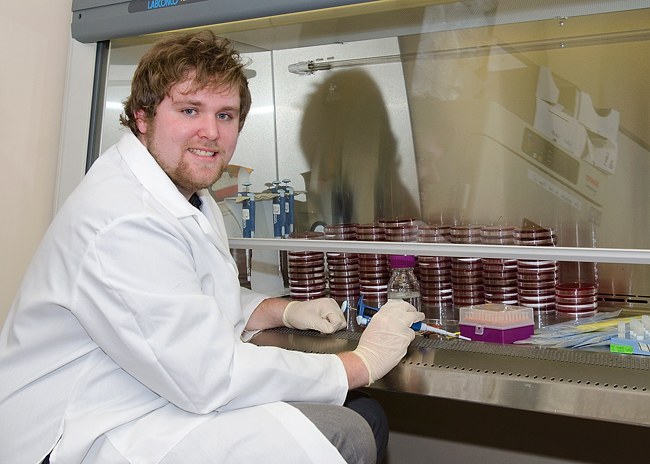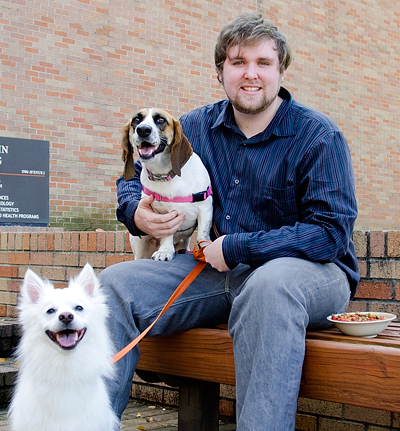Senior Digs Into Microbiology Project Examining Bacteria In Pet Foods
Feb. 18, 2013
SHSU Media Contact: Jennifer Gauntt
Story By: Kim Morgan

High school is a time for testing the waters, sampling a little bit of everything, figuring out what you want to be when you grow up; it can be hard to settle on a definitive course of action when it comes to college.
As Dallas Arnold discovered, sometimes you have to live it before you can love it.
"When I first went to college, I didn't really have any direction," said Arnold, a 24-year-old biology major at Sam Houston State University. "I just knew that going to college was something I needed to do because that's what everybody does."
Arnold originally opted to go the business route at Abilene Christian University.
"I thought it was hard," Arnold said. "But it wasn't because I'm not smart; it was just because I wasn't interested in it. Then when I began studying science, people thought I was really smart. But it's not that; it's just that I'm doing what I like."
After a year at ACU, Arnold's interest was waning. Business, to Arnold, was boring.
"I had a friend in veterinary medicine, and I found it really interesting when he talked about science, how cells work and everything," Arnold said. "It took about a year for me to finally say 'I think I want to find out more about this.’"
Arnold switched to biology and transferred to SHSU, thinking perhaps a career as a physician would suit him. But then he was introduced to microbiology.
"That's when I knew medicine wasn't what I really wanted to do," Arnold said. "What I really want to do is research."
Under the guidance of Aaron Lynne, SHSU assistant professor of molecular microbiology, Arnold has had plenty of opportunity to, well, research research.
Lynne encourages his students to identify an area of interest, which for Arnold is related to microbiology, the study of microscopic organisms.
Arnold is currently working on a project titled "Bacterial Analysis of Bone and Raw Food Diets for Pets," studying the microbial content in raw-food diets on domesticated pets and their owners.
“Bone and raw-food diets are a very specific niche within the animal dietary world. You have your Kibbles and Bits and your normal wet food, and everyone knows about those, but bone and raw food diets are essentially an animal that has basically been ground up,” he said. “The idea behind the bone and raw food diet is that the pets we have were once wild animals; they used to eat meat that was raw. The people who developed this diet are saying we need to get our pets back on that diet because that’s where they came from.
“But the animals that we have now have evolved, or have been selected, so that they’re used to the Kibbles and Bits, and they’re not really used to what nature would provide them,” he said.
Over the past two years, Arnold has been testing 10 types of meat from five brands of bone and raw foods and has found more than just bones, chicken, salmon, beef, lamb and turkey. He discovered several potential pathogens, including Salmonella, E. coli and Staphylococcus. He's still testing for Shigella, one of the most common causes of "traveler's diarrhea," which is easily spread through contaminated feces.
 “They literally grind up anything they can,” he said. “Usually there is bone in it, sometimes they’ll add vegetables, but there isn’t really any post-processing; it’s just straight meat that’s wrapped up and sent off to special food stores. You can’t find this stuff here in Huntsville, but you can find it in specialty stores like in Houston and Austin.
“They literally grind up anything they can,” he said. “Usually there is bone in it, sometimes they’ll add vegetables, but there isn’t really any post-processing; it’s just straight meat that’s wrapped up and sent off to special food stores. You can’t find this stuff here in Huntsville, but you can find it in specialty stores like in Houston and Austin.
“I haven’t found any Shigella so far, which is really good because Shigella is a pretty dangerous bacteria,” he said. “But the other three types have tested positive.”
With these potential pathogens in play, pets eating the raw food and owners handling the raw food are both at risk of food poisoning, he said.
“I’m testing to see what are the potential hazards for the owner of the pet,” he said, adding that he would eventually like to examine the potential for contamination of pet owners through contact with a pet who has consumed the food with the dangerous pathogens, but that requires special licensing. “Any unprocessed, raw meat like this meat always has an associated risk of having pathogens or anything like that. Generally this food is not supposed to be cooked, so the owner will take it out, cut a portion for their animal and feed it to them.”
Arnold said his experiments are not an attempt to determine whether people should feed their pets raw foods, but is simply examining potential hazards.
“Handling raw meat, even raw meat that’s made for human consumption, there’s always an associated risk with it; that’s why they say to cook it thoroughly,” he said.
Arnold is completely responsible for the project and has taken 100 percent ownership of it.
"It's entirely up to him to generate results," Lynne said. "It requires a lot of time and effort."
Arnold's goal is to publish his research results before graduating this summer, at which time he may take a few months off before settling on a university for his master's degree, followed by his doctorate.
It seems Arnold's track has indeed changed from M.D. to Ph.D.
His long-term vision extends to the world of viruses, microscopic organisms that require host cells in order to reproduce and survive. He's particularly interested in the Human Immunodeficiency Virus, HIV, for its reverse transcriptase properties.
"It gives you its genes and basically says 'this is part of you now,’" Arnold said. "It's crazy."
Arnold is also awestruck by phages, "things that devour," and the medical implications of using viruses, instead of antibiotics, to treat bacterial infections in humans.
A career based in viral research comes with plenty of options, ranging from military bases to biosafety level-4 laboratories—where the most exotic, deadly agents are contained—at the Centers for Disease Control.
But Arnold would prefer to go back to university, this time as a professor.
"My dad was a teacher for a very long time, in primary education," Arnold said. "That must be where I got my love for explaining concepts to others who don't understand."
Arnold has had a small taste of that, tutoring primary-school students in math.
As for the desire to take it to the university level, Arnold credits his SHSU professors for introducing him to the possibility. As for the drive to confidently make a choice when the road forked at business and biology, Arnold credits his mother.
"She encouraged me to do what I wanted to do," Arnold said. "She said if you're doing something you like, you'll never work a day in your life."
Arnold's parents are SHSU alumni. His mother D'Ann graduated with a degree in psychology; his father Desmond with a degree in education and criminal justice.
"My philosophy is that if we all took the time to really evaluate ourselves, to figure out what we're good at and go after it," Arnold said, "we would all be happier."
- END -
This page maintained by SHSU's Communications Office
Associate Director: Julia May
Manager: Jennifer Gauntt
Located in the 115 Administration Building
Telephone: 936.294.1836; Fax: 936.294.1834
Please send comments, corrections, news tips to Today@Sam.edu.

 SamWeb
SamWeb My Sam
My Sam E-mail
E-mail

